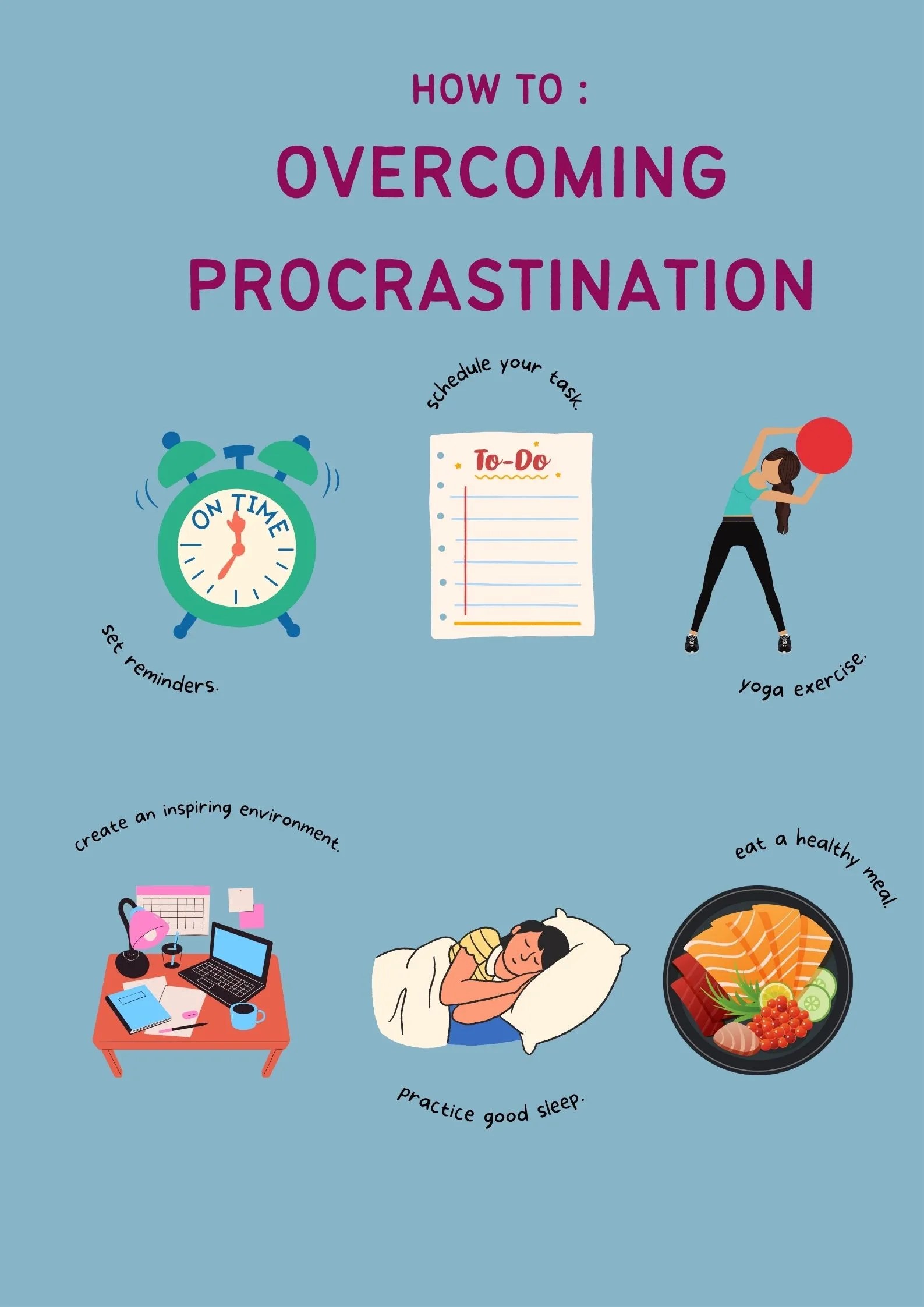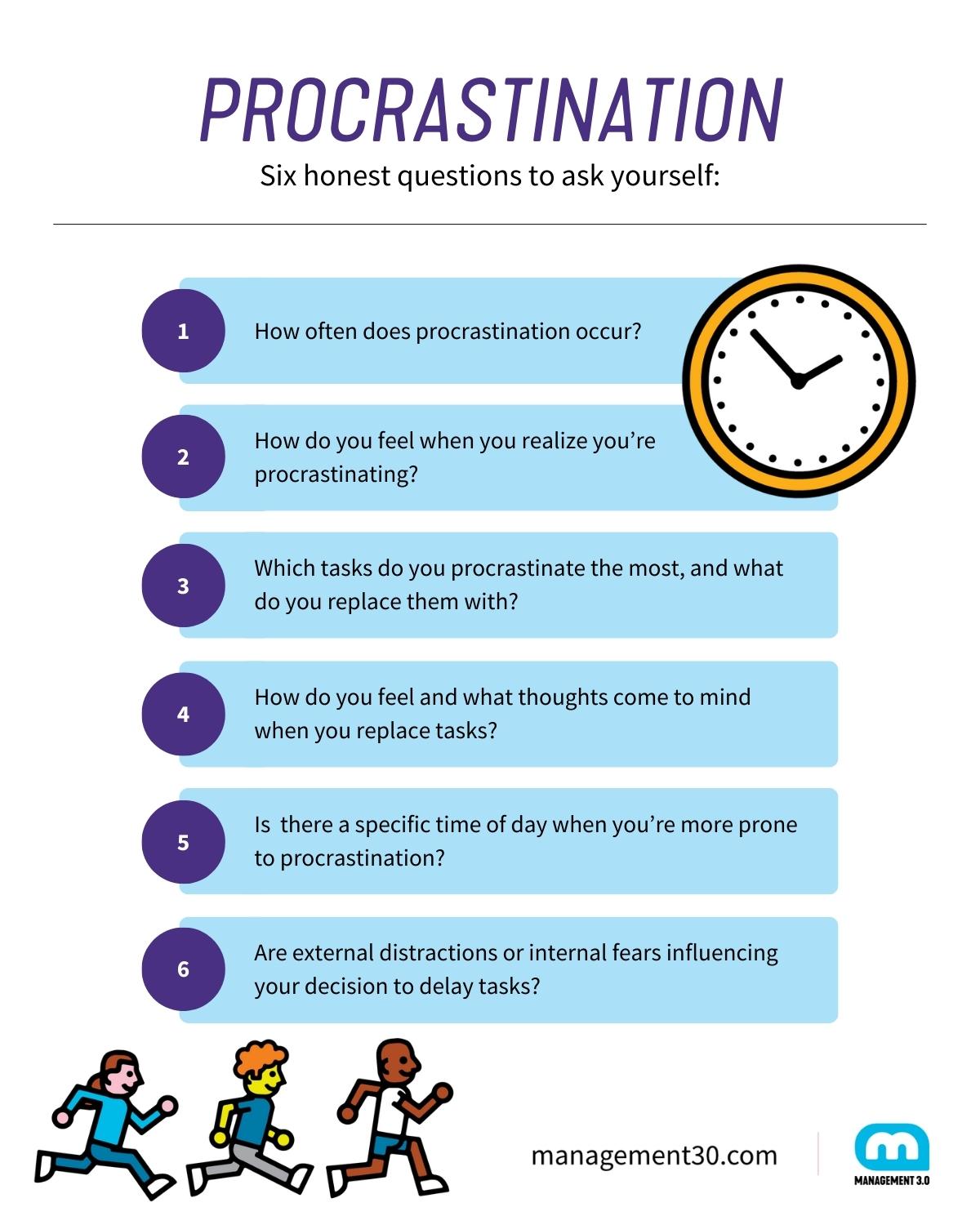Overcoming Procrastination: Practical Strategies to Get Things Done
Procrastination is a common challenge that affects many people, from students to professionals. It’s the habit of delaying tasks despite knowing that it may lead to negative consequences. If you find yourself constantly putting things off, it’s important to address the root cause of your procrastination and adopt effective strategies to overcome it. This article will explore the reasons behind procrastination and offer practical tips to help you beat it once and for all.

Why Do We Procrastinate?
Procrastination isn’t just about being lazy—it’s often linked to deeper psychological factors. For many, it’s a way of avoiding tasks that seem overwhelming, boring, or anxiety-inducing. Sometimes, procrastination is a result of perfectionism, fear of failure, or a lack of motivation.
Common Causes of Procrastination:
-
Fear of failure: Worrying about not doing something perfectly can lead to delaying the task altogether.
-
Lack of motivation: Without a strong sense of urgency or personal connection to a task, it’s easy to put it off.
-
Overwhelm: Large or complex tasks can feel daunting, leading to procrastination.
-
Distractions: Social media, TV, and other distractions can take priority over important tasks.
Understanding the cause of your procrastination is the first step in breaking the cycle.
1. Break Tasks Into Smaller Steps
One of the most effective ways to overcome procrastination is to break large tasks into smaller, more manageable parts. When faced with a huge project, it’s easy to feel overwhelmed and put it off. By dividing the work into smaller steps, you’ll create a clear roadmap and make the task feel less daunting.
How to Break Down Tasks:
-
Start by identifying the key components of the task.
-
Focus on completing one small step at a time instead of worrying about the entire project.
-
Celebrate each small victory to maintain motivation.
Taking small, actionable steps helps reduce feelings of overwhelm and makes it easier to get started.
2. Set Clear and Achievable Goals
Setting clear, realistic goals is crucial in the battle against procrastination. When your goals are specific, measurable, and achievable, it becomes much easier to take action. Having a clear sense of direction can motivate you to stay on track and resist the temptation to delay.
How to Set Effective Goals:
-
Use the SMART goal framework (Specific, Measurable, Achievable, Relevant, Time-bound).
-
Break down large goals into smaller milestones.
-
Set deadlines for each goal and hold yourself accountable.
By setting well-defined goals, you give yourself a roadmap that guides you toward completing the task efficiently.
3. Eliminate Distractions
Distractions are one of the biggest contributors to procrastination. Social media, phone notifications, and other digital distractions can pull your attention away from the task at hand. To overcome procrastination, it’s essential to minimize these distractions while you work.
Tips to Minimize Distractions:
-
Turn off phone notifications or put your phone on Do Not Disturb mode.
-
Create a designated work environment free from distractions.
-
Use website blockers or apps that limit your access to social media during work hours.
By removing distractions, you’ll find it easier to focus and make progress on your tasks.

4. Use Time-Blocking Techniques
Time-blocking is a productivity strategy that involves allocating specific blocks of time to tasks. This method helps create a sense of urgency and ensures that you dedicate time to important activities without interruption. Time-blocking also helps you organize your day effectively and prioritize tasks based on urgency and importance.
How to Time-Block:
-
Schedule specific time slots for different tasks throughout your day.
-
Avoid multitasking during these blocks—focus solely on the task at hand.
-
Set breaks between time blocks to refresh and prevent burnout.
By scheduling focused time blocks, you’re less likely to put things off and more likely to stay on task.
5. Tackle the Hardest Tasks First
If you’re someone who tends to procrastinate because certain tasks feel overwhelming, try the Eat That Frog technique. This involves tackling the most difficult or unpleasant task first, when your energy and focus are at their peak. Once you complete the hardest task, everything else will feel easier.
How to Use This Technique:
-
Identify the task you’ve been putting off the longest or find the most challenging.
-
Commit to completing this task first thing in the morning or during a time when you feel most focused.
-
Once you finish the hardest task, move on to smaller, easier tasks.
By starting with the most difficult task, you’ll feel a sense of accomplishment that can propel you through the rest of the day.
6. Understand Your “Why”
Sometimes, procrastination arises from a lack of personal connection to the task. When you don’t understand the purpose behind a project, it’s hard to find the motivation to complete it. By identifying why the task matters to you, you can create a sense of urgency and purpose that helps you overcome procrastination.
How to Connect with Your “Why”:
-
Ask yourself how completing the task will help you reach your long-term goals.
-
Reflect on how accomplishing the task will make you feel.
-
Consider the consequences of not completing the task.
Connecting your tasks to personal goals and emotions can make them feel more meaningful and increase your motivation to act.

7. Use the Two-Minute Rule
The Two-Minute Rule is a simple yet effective strategy for overcoming procrastination. The rule states that if a task takes two minutes or less to complete, you should do it right away. This helps prevent small tasks from piling up and becoming overwhelming.
How to Apply the Two-Minute Rule:
-
If you can complete the task in two minutes or less, do it immediately.
-
For tasks that take longer, break them down into smaller parts and tackle them step by step.
By tackling quick tasks right away, you’ll reduce the mental clutter and avoid procrastination on bigger tasks.
8. Stay Accountable
Accountability can be a powerful motivator in overcoming procrastination. When you share your goals with others, you’re more likely to stay on track and follow through. Having someone check in on your progress or simply knowing that you’ve committed to a goal can provide the extra push you need.
How to Stay Accountable:
-
Share your goals with a friend, family member, or coworker.
-
Set regular check-ins or progress updates to ensure you stay on track.
-
Join a group or community with similar goals for mutual support.
Accountability helps you stay focused and committed to completing your tasks.
FAQs About Overcoming Procrastination
What is the best way to overcome procrastination?
The best way to overcome procrastination is by identifying the root cause and using strategies like breaking tasks into smaller steps, setting achievable goals, and eliminating distractions. Consistency is key to making these habits stick.
Why do I procrastinate even though I know it’s bad for me?
Procrastination often stems from psychological factors such as fear of failure, perfectionism, or lack of motivation. Addressing these underlying issues can help you break the cycle.
How long does it take to overcome procrastination?
Overcoming procrastination is a gradual process. It can take weeks or months to establish new habits and routines, but with persistence, you can significantly reduce procrastination.
Can procrastination be completely eliminated?
While it may not be entirely eliminated, procrastination can be greatly reduced by consistently using productivity techniques and addressing the underlying causes.
Conclusion
Procrastination can be a tough habit to break, but with the right strategies and mindset, you can overcome it. By breaking tasks down, setting achievable goals, and minimizing distractions, you can develop a more productive routine. Remember, the key to overcoming procrastination is persistence. Start small, stay consistent, and soon you’ll notice a significant improvement in your ability to get things done.
For more tips on boosting productivity and managing time effectively, check out our article on effective time management strategies.








